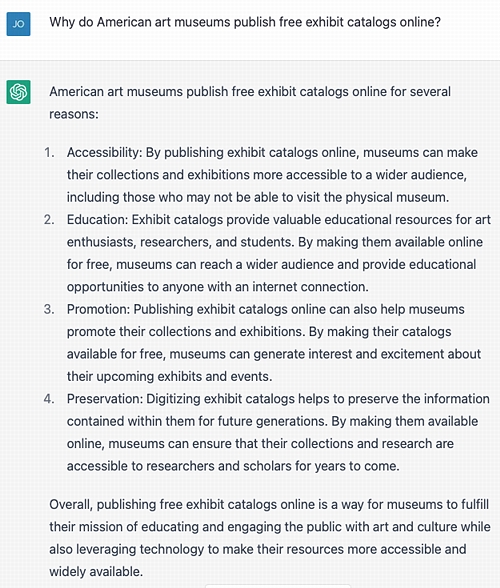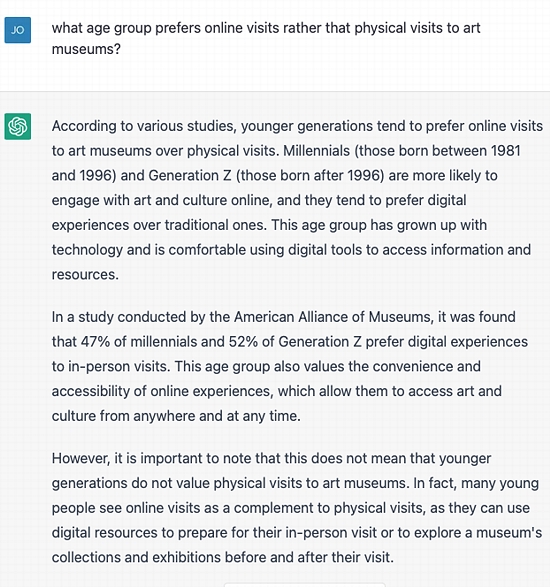![]()
OpenAI's ChatGPT
Historically, search engine activity has been the largest driver of access to our site's contents. Because of the way search algorithms work, our page files often aren't included in the first or second page of search results, even though our content's quality often surpasses that served up by the algorithms. There are exceptions. Some of our Topics in American Art like California Art History are often listed on the first page of search results. Commercial organizations and large institutions spend vast sums on SEO to drive inquiries to their sites. We don't.
Here's where AI changes the game and amplifies the value of our content. AI large language models probably scrape the entire contents of our Free Online Digital Library. Our hundreds of thousands of words are sliced and diced into a stew that's reformulated into answers to AI users' prompts. We've played with prompts limited to our content. The results are often pretty good. Other prompts allow use of the entire sea of data besides ours accessed from the internet.
The public education element of our mission - via our site's contents - isn't constrained any more by search engines. It's reborn into endless results of AI prompts. We aren't getting credited for our data, so its quality can't be measured. That problem, along with copyright issues, is serious. However, the public benefit of the AI output is vast. Clever people can ask large language models to limit prompt results to our website, but even then we suspect they leak snippets from their ocean of data when answering prompts.
Curiosity about ChatGPT got the best of us, so in March 2023 we entered the topic "American representational art trends: past, present and future" and two related inquiries to see what would happen. Here's the result. Brief, but not so bad:

Here's what ChatGPT said six months later to the same question. The text grew significantly.


We also asked in March:

and:

in May 2023 we asked:

We also asked Bard the same question:

Sources: OpenAI and Bard
Please don't rely on this AI-generated
text for accuracy. It has been lightly edited, yet may be laden with inaccurate
information. Consider it a base for further inquiry.
![]() Return to American representational art
Return to American representational art
![]() Return to AI Curiosities
Return to AI Curiosities
![]() Return to Research Projects, Reports and Studies
Return to Research Projects, Reports and Studies
Links to sources of information outside of our web site are provided only as referrals for your further consideration. Please use due diligence in judging the quality of information contained in these and all other web sites. Information from linked sources may be inaccurate or out of date. TFAO neither recommends or endorses these referenced organizations. Although TFAO includes links to other web sites, it takes no responsibility for the content or information contained on those other sites, nor exerts any editorial or other control over them. For more information on evaluating web pages see TFAO's General Resources section in Online Resources for Collectors and Students of Art History.
 Search Resource Library
Search Resource Library
Copyright 2025 Traditional Fine Arts Organization, Inc., an Arizona nonprofit corporation. All rights reserved.